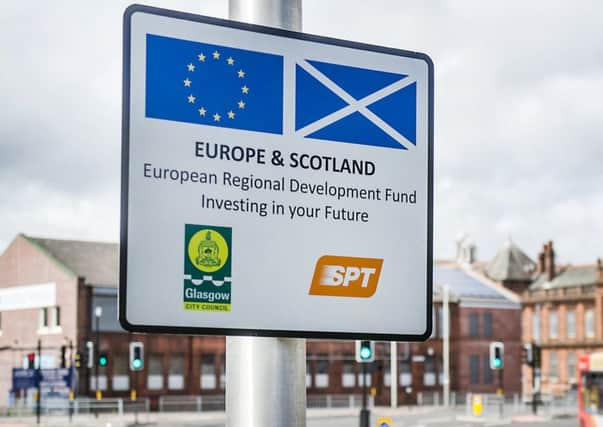Scotland set to lose £200m a year in funding after UK leaves EU


Vital cash to help create jobs, boost training, and develop transport projects and green energy are among areas at risk.
Scientists also fear key research grants will dry up.
There are major question marks over future support to farmers and the country’s fishing industry.
Advertisement
Hide AdAdvertisement
Hide Ad

Future loans from the European Investment Bank which have helped fund roads, railways and hospitals are also in doubt.
Scotland pays more to the EU than it receives in European funding.
However, Scottish ministers fear this will not be passed back from Westminster as part of a Brexit deal.
Scotland contributed some £6.5 billion (€7.8bn) to the EU and got back £5bn (€6bn) between 2007 and 2013, according to the Scottish Parliament Information Centre (Spice).


Over the current European funding period, from 2014-20, Scotland has been allocated the equivalent of more than £100m a year in “structural” funds to offset economic deficiencies.
The country is also expected to win around £120m a year in scientific grants under the EU’s Horizon 2020 research programme.
However, if Scotland were to leave the EU along with the UK, it would be up to the UK government to decide whether to plug the gap.
Transport minister Humza Yousaf, who is close to First Minister Nicola Sturgeon, told Scotland on Sunday: “There are massive implications for Scotland and there is no guarantee the funds will come back to Scotland.
Advertisement
Hide AdAdvertisement
Hide Ad“The Conservative leadership candidates [and likely next prime minister] are not people sympathetic to Scottish wishes.”
There is further uncertainty because Scotland’s future relationship with the EU – if it leaves – is unknown, and thus it could determine whether the country remains eligible for assistance. Non-EU countries such as Norway can apply for some grants.
Scotland was due to receive £787m (€941m) in direct European funding between 2014 and 2020, or more than £110m a year.
These come from “structural” funds to areas such as employment, and are paid out under the European Social Fund and European Regional Development Fund.
The hundreds of recipients from the previous seven-year funding round, totalling £686m (€820m), have included arts centres, bridges, wind farms, conservation projects and training for jobseekers.
The Scottish Government said these had created more than 40,000 jobs, helped nearly 100,000 people find work and assisted a similar number of new businesses and enterprises. The projects usually also involved funding from other bodies.
They included upgrading roads, such as in Harris and Skye, improving Dalmarnock Station in Glasgow for the Commonwealth Games, refurbishing the city’s Maryhill Burgh Halls and constructing the Loch Carnan wind farm in South Uist. Past funding has included the Falkirk Wheel canal boat lift.
The Scottish Government, which manages the funds for the European Commission, has so far published only five projects under the current funding round, worth a total of £146m, which are centred on job creation and boosting manufacturing.
Advertisement
Hide AdAdvertisement
Hide AdThese include a Low Carbon Infrastructure Transition fund, to help the development of low-carbon products, which has £33m of European funding. The Scottish Government said those projects, running to 2018-19, were “legally committed” and would be unaffected if Scotland left the EU.
However, organisations funded in the past were less sure. Enable Scotland campaigns director Jan Savage said: “We would be concerned that, if this funding were to disappear, people would lose out on the opportunity to live as part of an equal society.
“We have to make sure that people in Scotland who have learning disabilities do not lose out as a result of the UK breaking away from the European Union.”
Andy Kerr, executive director of the Edinburgh Centre for Carbon Innovation, said: “We are concerned about longer-term funding prospects. We anticipate that EU funding streams will be open to us for at least the next couple of years, but there is huge uncertainty thereafter.”
Robert Farquharson, chief executive of The Action Group, for people with support needs, said: “UK employability programmes are being devolved to Scotland, unfortunately with seriously reduced budgets.
“If, in the future, there was also the loss of EU funding it would be a huge backward step.”
Children’s charity Barnardo’s Scotland said it had a “significant level of concern” over funding.
The EU also funds scientific research through the Horizon 2020 programme, for 2014-20, with Scottish universities and other research centres winning at least £182m (€217m) so far from successful applications.
Advertisement
Hide AdAdvertisement
Hide AdAcademics fear Scotland could lose both funding and equally crucial collaboration with EU colleagues.
Professor Anne Glover of Aberdeen University, a former chief scientific adviser to the European Commission, said Scotland had been expected to secure around £840m (€1bn) from Horizon 2020 – the equivalent of £120m a year – based on its success in the previous funding programme.
However, Glover said that funding was at risk if the country left the EU because she doubted the UK government would make up the shortfall.
She said: “My confidence is not high. UK funding has not kept pace with inflation and they have not got a track record for increasing funding.”
But Glover said if Scotland could still apply for European grants after Brexit, it would be unable to influence what research was eligible. The UK fought off attempts to remove stem cells from the programme – an area where Scotland excels.
Equally uncertain is Scotland’s biggest source of European funding: from the Common Agricultural Policy (CAP).
Scotland received £560m in agricultural support payments in 2014, and it is not known what will replace the CAP should Scotland find itself outside the EU.
The country is also due to get £90m under the European Maritime and Fisheries Fund from 2014-20, whose future has also to be decided.
Advertisement
Hide AdAdvertisement
Hide AdThe National Farmers Union of Scotland said: “While the outcome of the vote brings a period of significant uncertainty, it also presents an opportunity to negotiate the best possible deal to support our farming and food sectors.”
But the National Trust for Scotland said the loss of CAP support from its farmland, which it used for conservation, would be “a great blow”.
The Scottish Government sought to put a brave face on the prospects for funding. A spokeswoman said: “We are intent on pursuing all options to maintain Scotland’s EU status so that these benefits can be preserved.
“European structural funds will clearly be a key part of those negotiations.”
However, the European Movement in Scotland, which campaigned for the UK to remain in the EU, feared the country would lose out.
Policy adviser Alex Orr said: “In the event of Brexit, Scotland would be at the whim of Westminster as to how any such funding was allocated.
“We are conscious of the desire of the government at Westminster to focus on delivering the Northern Powerhouse [in England].
“There is therefore clearly a concern that funding which has benefited key areas, such as the Highlands and Islands and south-west Scotland, may not continue at the sort of levels currently enjoyed, with obvious implications for those in these communities.”
Advertisement
Hide AdAdvertisement
Hide AdThe UK government pledged to look after Scotland’s interests once the Brexit process begins.
A spokesman said: “These negotiations will involve all the devolved administrations to make sure the interests of all parts of the UK are protected.”